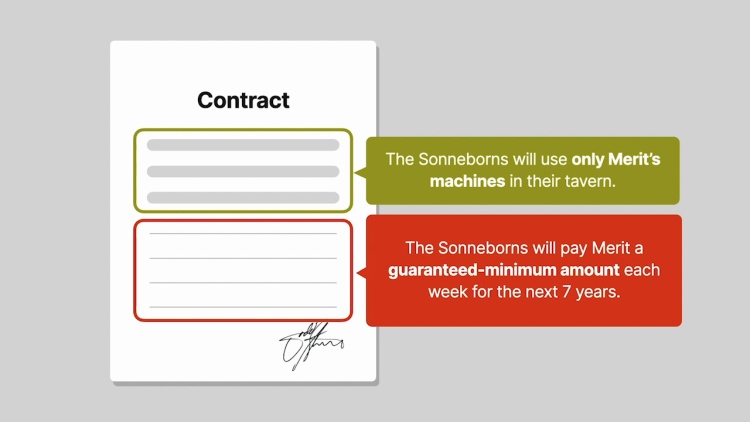Merit Music Service, Inc. v. Sonneborn
Maryland Court of Appeals
225 A.2d 470, 245 Md. 213 (1967)

- Written by Sean Carroll, JD
Facts
The Sonneborns (defendants) were in the process of purchasing a bar. Merit Music Service, Inc. (Merit) (plaintiff) leased coin-operated amusement and vending machines to bars and other establishments, including to the Sonneborns in a bar they previously owned. To help cover the payment for their new bar, the Sonneborns requested a loan from Merit. The Sonneborns put up their liquor license as security for the loan and believed that this was the only security that Merit required. However, testimony indicated that Merit also wanted to require the Sonneborns to lease and install in the new bar a minimum number of Merit machines. Evidence was conflicting as to when and to whom Merit made this request. Merit signed the loan check and obtained the assignment of the liquor license, all in the presence of the Sonneborns’ attorney. Then, later that night, Merit presented the Sonneborns with a form machine leasing contract and asked them to sign it. Merit had added minimum guarantee clauses to the leasing contract, which also contained a clause forbidding the Sonneborns from using machines from other companies. The Sonneborns, thinking that the contract was simply the note for the loan, signed it without reading it. The Sonneborns’ attorney was no longer present when they signed this contract. Subsequently, Merit filed suit, asking the court to enjoin the Sonneborns from leasing other machines and seeking money damages. The Sonneborns stated that they never would have signed the minimum guarantee leasing contract had they known what it said. They posited that Merit may have altered the agreement after the Sonneborns signed it. The Circuit Court for Baltimore City ruled in favor of the Sonneborns. Merit appealed.
Rule of Law
Issue
Holding and Reasoning (Finan, J.)
What to do next…
Here's why 907,000 law students have relied on our case briefs:
- Written by law professors and practitioners, not other law students. 47,100 briefs, keyed to 996 casebooks. Top-notch customer support.
- The right amount of information, includes the facts, issues, rule of law, holding and reasoning, and any concurrences and dissents.
- Access in your classes, works on your mobile and tablet. Massive library of related video lessons and high quality multiple-choice questions.
- Easy to use, uniform format for every case brief. Written in plain English, not in legalese. Our briefs summarize and simplify; they don’t just repeat the court’s language.





